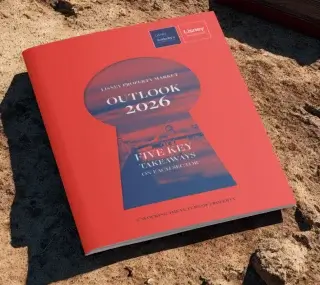read also
 Mortgage Approvals in Ireland Slump Sharply in January
Mortgage Approvals in Ireland Slump Sharply in January
 Lisney Property Market Outlook: Irish Property Market Poised for Steady Growth in 2026
Lisney Property Market Outlook: Irish Property Market Poised for Steady Growth in 2026
 Inflation in Romania Slows to 9.6% but Remains Above Forecast
Inflation in Romania Slows to 9.6% but Remains Above Forecast
 Riots in Mexico Disrupt Air Links to Resort Destinations
Riots in Mexico Disrupt Air Links to Resort Destinations
 UK House Prices Stabilise After 2025 Slowdown
UK House Prices Stabilise After 2025 Slowdown
 Israel Housing Market Eyes a Reset in 2026
Israel Housing Market Eyes a Reset in 2026
New Zealand Eases Rules for "Golden Visa" Program

New Zealand has adjusted the requirements for applicants seeking the Active Investor Plus visa, according to Bloomberg reporting. Wealthy foreigners will no longer need to prove English proficiency, and mandatory residency periods are being revised. The government believes that relaxing the rules for the country’s golden visa program will help attract more investment into the economy.
Background on New Zealand's Investor Visa Program
Changes to the Active Investor Plus visa have been discussed for some time. The program previously attracted high-net-worth individuals and brought in an average of NZ$1 billion ($580 million USD) annually. However, it declined after rule changes in 2022.
According to New Zealand’s Immigration Service, in the past two years, only 35 applications were fully approved, resulting in NZ$352 million in investment funds.
In late 2024, Finance Minister Nicola Willis acknowledged that previous policy adjustments had significantly reduced the number of investors. She emphasized the need for new reforms to accelerate application processing, as the country relies on foreign capital to meet its economic goals.
“Attracting wealthy migrants isn’t just about money; it’s about new connections, knowledge, expertise, and ideas that they bring with them,” Willis stated.
New Investor Visa Requirements (Effective April 1, 2025)
Under the current rules, applicants must invest at least NZ$5 million ($2.85 million) in direct investments or NZ$15 million ($8.55 million) in passive investments such as publicly traded stocks. Previously, the minimum investment threshold was NZ$3 million ($1.7 million).
Note: Bonds and real estate, which were historically popular investments in New Zealand, no longer qualify under the new visa program.
For some foreign investors, the inability to purchase residential property has been a major obstacle, due to a 2018 ban on foreign homeownership (except for Australians and Singaporeans). Before the 2023 general election, the National Party proposed relaxing this restriction, allowing foreigners to buy homes worth at least NZ$2 million ($1.14 million). However, this policy was blocked during coalition government negotiations.
Starting April 1, 2025, the Active Investor Plus visa will be issued under two categories, with expanded investment options, as announced by Immigration Minister Erica Stanford.
New Investment Options & Residency Requirements
NZ$5 million ($2.8 million) in managed funds
New minimum stay: 21 days over 3 years (previously 117 days over 4 years)
NZ$10 million ($5.6 million) in bonds, stocks, new real estate development (including residential), or existing commercial & industrial properties
Minimum stay: 105 days over 5 years, with the option to reduce residency time by investing more than the minimum requirement.
“Capital is highly mobile, and in an increasingly complex world, people are looking for a safe and stable country to do business,” said Stanford.
“We are simplifying and making our investor visas more flexible to encourage them to choose New Zealand as their destination.”
New Zealand Eases Visa Rules as Other Countries Restrict Them
New Zealand's move to relax investor visa requirements comes at a time when many other countries are ending or tightening their golden visa programs.
Spain will shut down its Golden Visa program on April 3, 2025.
The UK, Ireland, the Netherlands, Greece, and Malta have either discontinued or tightened their golden visa rules.
Australia recently eliminated its “Significant Investor” visa, which required an investment of at least AU$5 million ($3.2 million USD) due to concerns about abuse and lack of economic contributions.
Many wealthy individuals used golden visa programs to buy real estate or financial assets but failed to make a substantial economic impact.
Potential Impact on New Zealand’s Real Estate Market
Marcus Beveridge, a business migration specialist and managing director of Queen City Law in Auckland, believes the new rules could revive New Zealand’s sluggish housing market.
“Over the past couple of decades, every time we introduce policies like this, the real estate market picks up,” Beveridge stated.
“It’s not just about a large number of people crossing the border; it’s about the financial investment that starts the process and fuels market growth.”


